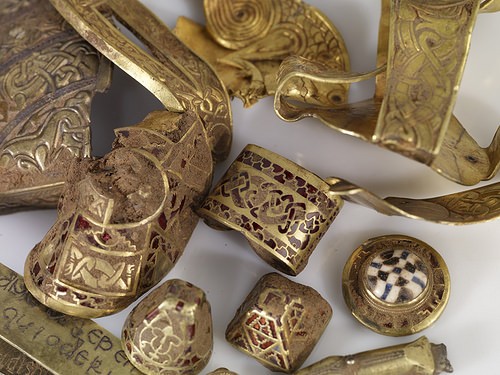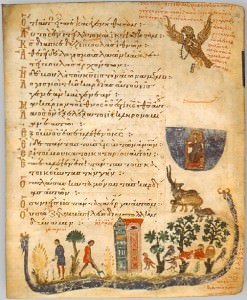Queer Pedagogy (A Roundtable)
A roundtable discussion on teaching Queer Theory with Susannah Mary Chewning (Union County College) Lisa Weston (California State University–Fresno); and Michelle M. Sauer, (University of North Dakota)
Constructions of Gender in Medieval Welsh Literature
The discussion of gender in medieval literary criticism is generally considered
to be a relatively new field, having achieved real momentum only in the latter half of the twentieth century. However, since it was the early fifteenth century when Christine de Pisan wrote a response to Jean de Meun’s Romance of the Rose, it cannot really be imagined that the medieval audience was too primitive to be fully aware of the subtext inside their stories.
The Staffordshire Hoard and the Mercian Royal Court
In England, whatever date you prefer for the composition of Beowulf, it is of interest that the poet thought of the king as a goldwine gumena – the gold-friend of the warriors – or as the goldwine Geata – the gold-friend of the Geats.
Beowulf, a Christian poem: an approach to certain difficulties
This work has for its object to show that Beowulf is a Christian poem, written by a Christian poet, for a Christian audience of the eighth century.
Recreating Beowulf’s “Pregnant Moment of Poise”: Pagan Doom and Christian Eucatastrophe Made Incarnate in the Dark Age Setting of The Lord of the Rings
The following chapters will explore how Tolkien fuses themes and imagery from the pagan Norse apocalyptic myth of Ragnarök with Christian apocalyptic imagery and themes in a recreated Dark Age historical setting to create The Lord of the Rings.
The Verb in Beowulf
Thus, in a paper of the nature of this thesis, the Beowulfian novice is limited in scope and must be satisfied, at best, to open a small breach in the subject, examine one segment, focus his attention on one aspect, single out one featture of it, and channel the efforts of his research towards some contribution, no matter how small, to the overall scholarship in the field.
The Peace Weaver: Wealhthrow in Beowulf
My goal in writing this fictional novella is twofold: to make Beowulf more accessible to modern readers and to expound upon the less articulated female point of view in the poem.
VAGANTES: “What has Beowulf to do with a Christian King?” Heroic Legend as Poetic Speculum Principis
Through a rhetorical analysis based in grounded theory that analyzes fifteen speeches and their contexts made by Hroðgar, Beowulf, and Wiglaf, I will show how the poet appropriated the Beowulf legend to present a dramatized speculum principis using the rhetorical devices common to oral-traditional narratives to articulate the three traits of kingship most highly valued by both secular and sacred authorities: generosity, faith, and protectiveness.
Dragons: ancient creatures in modern times
Then an old harrower of the dark happened to find the hoard open, the burning one who hunts out barrows, the slick-skinned dragon, threatening the night sky with streamers of fire.
The Hero as a Reflection of Culture
As heroes, Achilles, Aeneas, Beowulf, and Roland reflect the values of the societies that created them.
Alfred the Great’s Burnt Boethius
One can trace the reason for these curious editorial developments to two factors: (1) the inaccessibility of the tenth-century manuscript, which everyone thought was destroyed in the 1731 fire, until its burnt remains were recovered at the British Museum in the 1830s; and (2) an overpowering edition-in-progress of the twelfth-century manuscript by the great seventeenth-century scholar Francis Junius, with extensive collations from the missing tenth-century manuscript.
Manuscript Variation in Multiple-Recension Old English Poetic Texts: The Technical Problem and Poetical Art
Twenty-six poems and fragments of poems are known to have survived the Anglo-Saxon period in more than one witness. These include poems from a variety of genres and material contexts: biblical narrative, religious poetry, riddles, charms, liturgical translations, proverbs, a preface and an epilogue, occasional pieces like ‘Durham,’ and historical poems like the Battle of Brunanburh.
A Response to Anglo-Saxon Heroism and Fourteenth Century Chivalry: Ideals for the Warrior in the Writings of J.R.R. Tolkien
While the chivalric ideal has continued to appear in British literature, Anglo-Saxon heroism with its bond between lord and thane has largely dropped away. The writings of J.R.R. Tolkien provide the striking exception to this.
Ingeld and Christ: A Medieval Problem
Students of Beowulf are familiar with the notion that the poem can be read as an attempt to answer Alcuin’s question, ‘Quid enim Hinieldus cum Christo?’ (What has Ingeld to do with Christ?).
Beowulf, Orality and the Anglo-Saxon Conversion
There is no source quite like the Beowulf manuscript, as it is the longest poem and the only epic composed in Old English which has survived to the modern era, and thus is central to any understanding of Anglo-Saxon literature.
Indecent bodies: gender and the monstrous in medieval English literature
Indecent bodies: gender and the monstrous in medieval English literature Oswald, Dana Morgan Thesis: Doctor of Philosophy, Ohio State University, English, (2005) Abstract While…
Lady killers: Women, violence, and representation in medieval English literature
The women of medieval English literature kill children, invade kingdoms, torture devils, and murder their enemies.
Grendel’s Mother in the context of the myth of the Woman in the Water
Grendel’s Mother in the context of the myth of the Woman in the Water By Charlotte Elizabeth Ball Master’s thesis, University of Birmingham,…
Grendel: A Manifestation of Medieval Fears
Grendel: A Manifestation of Medieval Fears By Deanna Briscoe Afternoons of Alterity: A Codex of the Medieval and the Monstrous (2011) Introduction: Many…
The Trumpet and the Wolf: Noises of Battle in Old English Poetry
The Trumpet and the Wolf: Noises of Battle in Old English Poetry By Alice Jorgensen Oral Tradition, Vol.24:2 (2009) Introduction: Battle and warfare…
The psychology of emotion and study of the medieval period
The psychology of emotion and study of the medieval period By Carolyne Larrington Early Medieval Europe, Volume 10, Issue 2 (2001) Introduction: ‘What…
Female Characters in Beowulf
They are neither passive nor powerless – they are actively struggling to define their place in the heroic world and their efforts are in many respects successful.
Drinking and Debauchery: Fifty Ways to Leave Your Beowulf (Butchered)
The filmic renditions analysed are Zemeckis’s 2007 performance capture Beowulf (the Hollywood version), and Sturla Gunnarsson’s Beowulf and Grendel (2005, a Canadian-Icelandic production): they both deviate from the original poem, but given their closeness in date, the different treatment is so considerable as to warrant comparison.
Removing the Christian mask: an examination of Scandinavian war cults in Medieval narratives of northwestern Europe from the late Antiquity to the Middle Ages
Removing the Christian mask: an examination of Scandinavian war cults in Medieval narratives of northwestern Europe from the late Antiquity to the Middle…
Monstrous Conversions: Recovering the Sacramental Bodies of The Passion of St. Christopher
This article examines the monstrous attributes of the dog-headed St. Christopher and his struggle to convert the pagan king Dagnus in the Old English Passion of St. Christopher.











